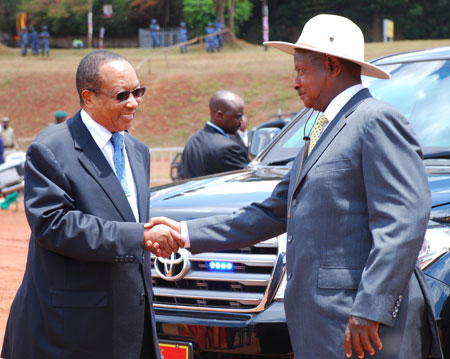US -Africa summit;
Here Are The Reasons Why President Museveni’s Agitation For ITTS With America
Is Shallow, Unrealistic And Untenable
Africa Needs To
Clamor For Infrastructure Projects Like Railways, Airports, Power Dams, Roads,
Mega Industries From The Western Powers
Early this month
a contingent of African leaders went to attend the US-Africa summit. Although
there were widespread petitions by several human rights bodies protesting
Ugandan president Museveni’s attendance, he managed to maneuver his way to the
summit.
American
president Joe Biden made a passionate plea to integrate Africa in the strategic
plans of his country and enticed the leaders with a 55 billion dollar outlay to
kick off the renewed friendship.
This pledge shows
that the American administration is willing to listen to good proposals from
the African leaders but they are a bit arrogant not to ake advantage of the
goodwill. For instance the Americans delivered most of the vaccines for the
covid19 pandemic.
This shows that
they can deliver on most of what we cannot produce.
Our (am talking
about Africa) problem is that we have leaders who think they can challenge the
western powers (remember Robert Mugabe, Ghadafi).
This arrogance has
made Africa lose the opportunity to discus and present the real issues to the
bigger western powers.
Ugandan president
Museveni has tried to challenge and even openly dismiss the western powers and
yet his country largely depends on their resources to make things move to a
more reasonable direction.
The western
powers have spent trillions to African economies in the sectors of health,
education and even security.
We should have
encouraged the western powers to assist us build infrastructure like roads, railways,
airports , ferries ,power dams etc.
But because of
arrogance African leaders try to impress by claiming that they don’t want aid
but want to trade with the western powers.
Yet the reality is
that most African countries may have the minerals and products that they can
trade but there are issues that make it difficult to trade them on the
international market.
This shows you
why Museveni’s AGOA failed miserably.
This explains why
this time Museveni was silent about his old song of promoting the African
growth and opportunities act which had created a trade arrangement between
Ugandan and the United States of America.
AGOA was a trade
arrangement which collapsed on its inception because Uganda couldn’t fulfill
its production potential. Although the US market was open to Ugandan products,
the East African country lacked the potential to produce those particular
products at a competitive level.
There was the
case of the cotton fabrics which Ugandan had intended to earmark as the first product
to export to the US market but ended up as an embarrassment when the Bugolobi
factory closed before it could produce any cotton fabrics.
This time
Museveni has again driven in the same direction of agitating for trade even
when he knows that he almost has nothing to sell the American market. He came up with a
very interesting acronym of ITTS (investment, trade, tourism and security)
as the message he was trying to advance at this US-African leader’s summit.
When you look
into his message you find that he was simply recycling the same arguments like
those of AGOA.
If you claim that
you don’t want aid but you want trade, do you have any products that can
impress the international market?
Recent experience
shows that the answer to that question is an afrimative NO.
Although Uganda
has got plenty of goods that can be put on the market , they need to be
upgraded to fit the international market.
For instance we
have very good pineapples here , but making them qualify to the standards need
a sophisticated value addition that can make them compete at the highest level.
Its true we have
cotton , but we don’t have the means to make it compete with the cotton from
other countries because we have failed to add the necessary vale that can
advance its quality.
What does this
mean?
This obviously means
that Museveni should have first tried to convince the western powers to give us
machines to set up industries that can add instant value to our cotton, coffee,
pineapples, beef, fish ,Chicken, eggs, tomatoes , hide and skins etc.
After setting up
the industries and making sure that they can produce high quality products that
can satisfy the local and regional market , he would then run to the western
powers to grant us the market to sell these products.
But the problem
is that he putting the cart before the horse. In other words he is busy pulling
the cart and praying that a horse will show up from somewhere. That cannot happen.
As a result of
this helter-skelter way of doing things, we (Uganda) have even failed to match
the standards on the regional market.
Our brothers of Kenya
who have a much bigger economy even slapped a ban on some of our Ugandan products
because of their poor quality.
The Kenyans rejected
our maize because it had toxins. Now if your maize cannot even rise to the
standard of Kenya, who do you expect it to even penetrate the American market?
THE WAY FORWARD
As stated earlier,
we should have pushed the western powers to help us build powerful things like
the railway line from Kampala to Cape Town, Kampala to Kinshasa and beyond. Build
power dams, airports and ports etc.
Other words, agitating
for trade and tourism with the western is simply a waste of time because our products
are too poor to compete in the international market.
The author Fred
Daka Kamwada is a researcher, policy analyst and blogger;kamwadafred@gmail.com




